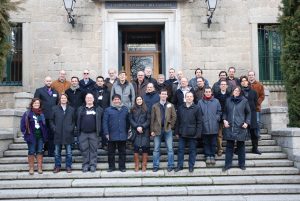News Story
Computational Creativity and Image Aesthetics Research
Monday 24 Feb 2014
KMi professor Stefan Rueger was invited to the First Annual Contact forum on Computational Creativity, 21-23 Feb 2014, to give a talk on his perspective on this area. Computational Creativity studies how to get software to behave in such a way that a human would consider the output to be a creative work. This encompasses computers writing poems, inventing jokes, using analogy, producing artwork, generating games, understanding language and much more. The Prosecco network, a coordinated support action to promote the scientific exploration of computational creativity, invited 22 researchers from Europe and the Americas in disciplines ranging from Computing to the Arts to a monastery-like environment in San Lorenzo de El Escorial near Madrid to discuss over a long weekend their practice, ideas and aspirations in this newly established and growing field.
The group of researchers did not spend much time debating how to define computational creativity. Instead participants showed their own work, eg, award-winning computer-generated art, and exchanged techniques and approaches to get software to make decisions in the creation process rather than the programmer putting all in place. Creativity did not stop at the outputs from software: one participant gave his presentation partially in a lipogram, without using words that contained an e.
One of the main paradigms favoured at this meeting was a create-assess-select&change cycle known in similar form in evolutionary algorithms. Stefan offered machine learning algorithms to assess the aesthetics of photographs, something his MSc students at Cranfield University have been working on in recent years. According to Simon Colton, a Professor of Computational Creativity at Goldsmiths, University of London, these techniques are crucial for affording software the ability to make informed decisions in its own right while pursuing creation of art. Although this weekend event cut his skiing holidays in the alps short, Stefan maintained that the event has been worth every minute spent: ”You can go skiing many weeks in the year, but it is hard to find a similar level of intellectual and creative buzz in a single place.”
Related Links:
Latest News
KMi’s report from SEMANTiCS 2025
KMi wins OU recognition of Excellence in Teaching Award
KMi experts present insights on Technology-Facilitated Gender-Based Violence to UN committee
KMi with a impactful presence at Open Repositories 2025
Alexander Mikroyannidis appointed International Expert in Distance Learning by A3ES

